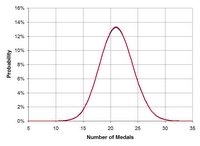First of all, I just wanted to pass along this link. It's something the kids are calling a "Google Maps Mashup," and it's a pretty cool little application for scanning the Olympic results of the day.
Updated Predictions

Figure 1 — Probability distribution for Canada's 2006 winter Olympic medal total.
Back here I made a probabilistic estimate of the number of medals Canada would win in Torino, based on my estimates of the probabilities for individual athletes and teams. I'm going to update that estimate as events are decided, one way or another. The blue curve shows my original (a priori) prediction, and the red curve shows the current prediction, accounting for events that have already happened.
Nothing very surprising happened today. Canada won one medal, in an event where I predicted a high probability of success; and they didn't win in a bunch of events where I said there was zero chance of winning. So the distribution has become slightly narrower, but is otherwise unchanged.
Now for two Olympic stories of the day. First, let me express my disgust with the thought that Michelle Kwan might withdraw from competition due to poor health and an inability to complete her program. It is a little late to discover that her body might not be able to back up her enormous ego in the claim that she is, by default, and without competing or training, better than every other figure skater in America. And the USFSA will look like complete idiots unless she skates, and skates well.
Speaking of enormous egos, the sports story of the day, for me, happened at the speed skating oval. US skater Chad Hedrick won the men's 5000 m in dominant form. He came within two one-hundredths of a second of breaking the Olympic record, set in 2002 on much faster ice, and beat his nearest competitor by almost two seconds. That competitor, world record holder Sven Kramer of the Netherlands, had the misfortune of skating just before Hedrick, but I don't think he can reasonably say that it made the difference. Kramer skated well enough to put the outcome in doubt, and that's something. The bronze medallist was also a great story, as Italy's Enrico Fabris just edged out the second entry from the Netherlands, Carl Verheijen. Fabris was in sixth place with three laps to go, and in fourth place with one lap to do.
Canada's Arne Dankers also had a great race, finishing fifth. That was better than he has ever done in the 5,000 m on the World Cup, which is exactly what you want to do at the Olympics.
Now I should take a few minutes to commend CBC on their coverage. They showed about 7 or 8 pairs of skaters live and in real time, even though each heat took more than 6 minutes. They talked a lot about Dankers, but not excessively so, and gave Hedrick, Kramer, and Fabris their due for their performances. The broadcast team did a good job of explaining what to watch for and keeping the viewer up to date. And maybe I missed it, but I didn't hear a peep about how it was the thirteenth anniversary of Hedrick's grandmother's death. All in all, a nice job of covering sports.


No comments:
Post a Comment